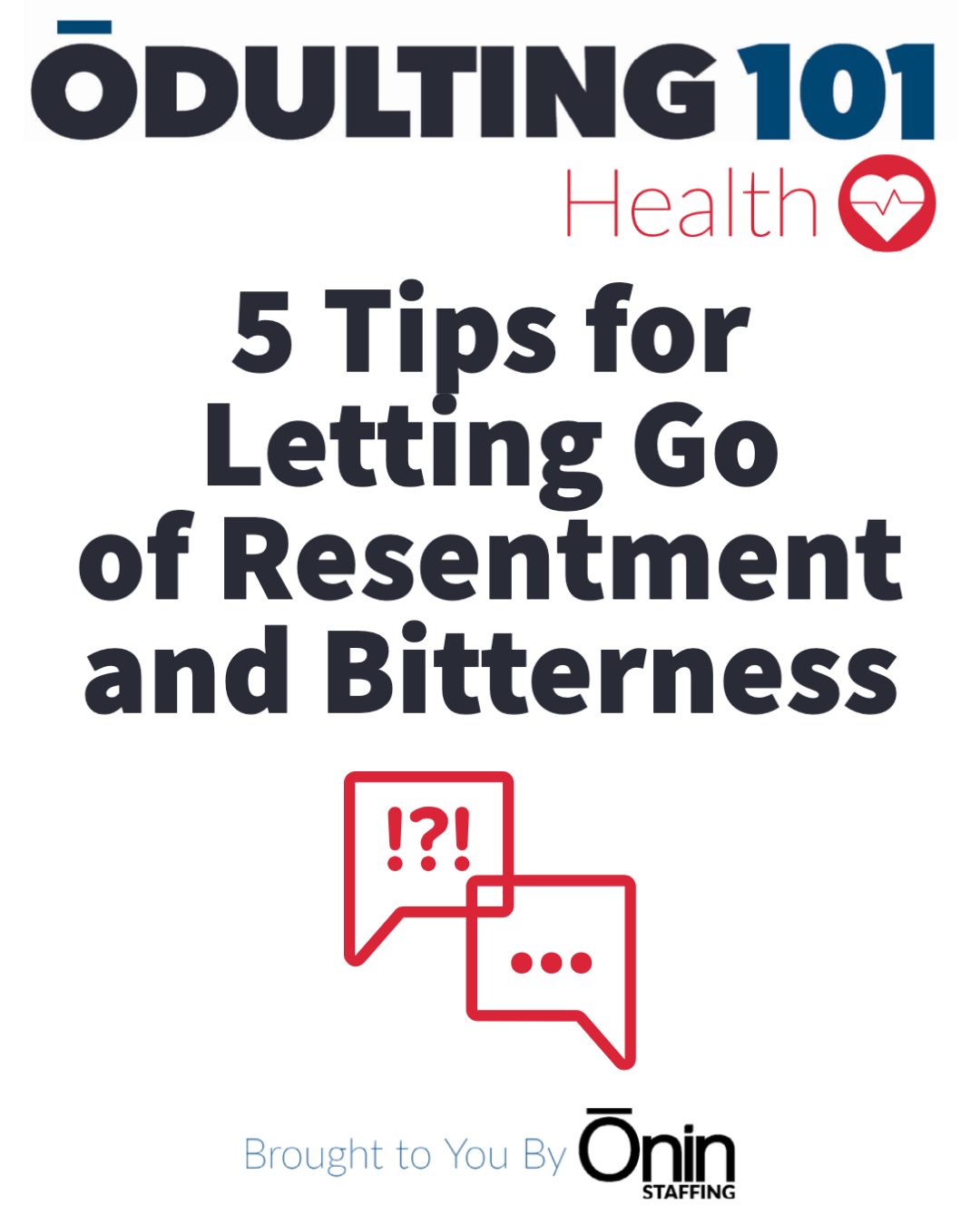
We all know how painful it is to carry resentment and bitterness. It may feel like you’re protecting yourself against future injustice, but really it just keeps us stuck in the past. As Deadpool said, “Pain doesn’t hurt if you never let go!” But don’t worry – here are some tips that can help us break free from these negative feelings:
1. Take Responsibility for Your Own Feelings:
Recognize that your feelings are a result of your own thoughts and interpretations. It is important to remember that our feelings are not someone else’s fault. We create them ourselves, and it is up to us to take responsibility for them. When we realize that our thoughts, interpretations and reactions have a direct impact on how we feel, it can help us let go of resentment and bitterness toward others. Taking ownership of our emotions gives us the power to choose how we want to respond in any given situation. With this awareness comes greater freedom from negative feelings like resentment and bitterness – allowing us space for more positive ones!
Look at events objectively and accept that you can’t control other people’s actions. Accepting that we can’t control other people’s actions is an important step in letting go of resentment and bitterness. It means understanding that our emotions are a result of our own thoughts, interpretations and reactions, rather than the fault of someone else. By taking ownership for how we feel, we give ourselves the power to choose how to respond in any given situation. This allows us more freedom from negative feelings like resentment and bitterness – leaving space for more positive ones! Practicing this kind of objectivity will help us break free from these destructive cycles and move forward with greater peace and joy.
Make an effort to separate facts from interpretations or assumptions. It is important to be mindful of the difference between facts and interpretations or assumptions when trying to break free from feelings of resentment and bitterness. When we can separate what actually happened from our own judgment about it, we are more likely to find objectivity in any given situation. This helps us take ownership for our emotions, rather than attributing them to someone else’s actions. Taking responsibility for how we feel gives us the power to choose how we want to respond, allowing us greater freedom from negative feelings like resentment and bitterness – leaving space for more positive ones! With this awareness comes a deeper understanding that our thoughts, interpretations and reactions have a direct impact on how we feel – something that will help us let go of these destructive cycles once and for all.
Challenge any negative thoughts, reframe them with positivity, and take any necessary corrective action so you don’t repeat the same mistake again.
It is essential to break free from the cycle of resentment and bitterness in order to lead a happier, more fulfilling life. This can be difficult, as these negative feelings are often deeply ingrained in our mindsets and may feel impossible to shake off. However, it is possible with some effort. By recognizing that our emotions are a result of our own thoughts and interpretations rather than someone else’s fault, taking ownership for how we feel, separating facts from interpretations or assumptions, challenging any negative thoughts and reframing them with positivity – we can let go of resentment and bitterness once and for all. With this awareness comes greater freedom from these destructive cycles – allowing us space for more positive ones!
2. Practice Self-Compassion:
Talk to yourself in kind and comforting ways instead of focusing on criticism and self-judgment. Self-compassion is an important part of leading a healthy and fulfilling life. It involves talking to ourselves in kind and comforting ways instead of focusing on criticism and self-judgment. Being compassionate with ourselves has been shown to help reduce stress, increase resilience, boost self-esteem, improve mental health and even lead to physical benefits such as improved immune functioning. Practicing self-compassion can also help us let go of resentments and bitterness towards others by taking ownership for our emotions rather than attributing them to someone else’s actions. With this awareness comes greater freedom from these destructive cycles – allowing us space for more positive ones!
Remind yourself of any progress you have made – even small steps count!
It can be easy to get discouraged when we don’t see immediate results for our efforts. However, it is important to remind ourselves that even small steps count and any progress made should be celebrated! Taking the time to recognize and appreciate our accomplishments, no matter how big or small they may be, gives us motivation to keep going on our journey towards achieving our goals. This also helps us break free from feelings of resentment and bitterness as we take ownership for how far we have come – allowing space for more positive emotions like joy and satisfaction. Reminding ourselves of all the progress we have made will give us the strength needed to make it through difficult times and ultimately lead a happier life filled with greater peace and contentment.
Focus on taking positive action rather than beating yourself up with negative thoughts.
It is easy to get caught up in negative thought spirals, leading to feelings of resentment and bitterness. But it is important to remember that we can break free from these destructive cycles by focusing on taking positive action rather than beating ourselves up with negative thoughts. Taking ownership for our emotions and reframing any negative thoughts with positivity will help us let go of resentments and bitterness once and for all – allowing us space for more positive ones! Practicing self-compassion, recognizing progress made so far and challenging any assumptions or interpretations are all essential steps towards achieving a happier life filled with greater peace and contentment.
3. Acknowledge Your Emotions:
Be mindful of your emotions and don’t try to ignore or suppress them – they are perfectly valid whether they are pleasant or unpleasant!
Acknowledging our emotions is an important step towards leading a healthier and more fulfilling life. We may be tempted to ignore or suppress them, but it is essential that we recognize the validity of all feelings – both pleasant and unpleasant. Understanding our emotions can help us take ownership for how we feel instead of attributing them to someone else’s actions, which can lead to greater freedom from destructive cycles like resentment and bitterness. With this awareness comes space for more positive ones! Taking the time to practice self-compassion, focus on taking action rather than beating ourselves up with negative thoughts, and recognizing progress made so far will all help us break free from these destructive patterns – ultimately allowing us the opportunity for a happier life filled with greater peace and contentment.
Accept your emotions without judgment, embrace them as part of being human, and find healthy ways to express them such as journaling or talking with a friend or counselor.
It is important to recognize that our emotions are valid and should be acknowledged without judgment. We may feel tempted to ignore or suppress them, but it is essential that we accept them as part of being human. This can help us take ownership for how we feel rather than attributing our emotions to someone else’s actions, which can lead to greater freedom from destructive cycles like resentment and bitterness. Finding healthy ways to express these feelings such as journaling or talking with a friend or counselor will also aid in breaking free from these patterns – ultimately allowing us the opportunity for a happier life filled with greater peace and contentment.
4. Learn To Move On:
Feel the emotions fully so you can move on from them instead of getting stuck in the past pain.
It is important to learn how to move on from painful experiences and emotions. This means allowing ourselves to feel the full range of our feelings, without judgment or suppression. Doing so will help us break free from destructive cycles like resentment and bitterness that can otherwise keep us stuck in the past pain. Acknowledging our emotions and taking ownership for how we feel instead of attributing them to someone else’s actions is an essential step towards leading a healthier and more fulfilling life – ultimately allowing us the opportunity for a happier life filled with greater peace and contentment.
Appreciate what has been learned from the experience, be thankful for whatever good has come out of it (even if it’s hard to see), then use this wisdom for growth in the present moment instead of dwelling on resentments from the past!
Appreciating what has been learned from the experience, being thankful for whatever good has come out of it (even if it’s hard to see), then using this wisdom for growth in the present moment instead of dwelling on resentments from the past are all important steps towards achieving greater peace and contentment.
Look at each day as a new beginning – make sure it counts!
Every day is a fresh start, an opportunity to make the most of your life and create something meaningful. It’s easy to get stuck in a rut and forget that every single day brings with it new possibilities. Rather than letting yourself be weighed down by past mistakes or regrets, use each day as an opportunity to move forward and grow. Appreciate the little things, take time for yourself, set goals for what you want to accomplish – no matter how small – and strive towards achieving them one step at a time. By learning to look at each day as a new beginning, you’ll find joy in every moment and strength in times of difficulty. Make sure each day counts!
5. Forgive Yourself & Others:
Understand that nobody is perfect – we all make mistakes every now and then!
It is important to remember that nobody is perfect and we all make mistakes every now and then. It can be difficult to accept our own imperfections, but understanding that it’s part of being human helps us move on from these moments without feeling too much shame or guilt. The same goes for forgiving others – while it may not always be easy, learning to forgive ourselves and those around us can help us break free from destructive cycles like resentment and bitterness, allowing us the opportunity for a happier life filled with greater peace and contentment. Learning how to accept our mistakes as part of being human, appreciating what has been learned from them, looking at each day as a new beginning, and taking ownership for how we feel are all essential steps towards achieving this goal.
Apologize earnestly if necessary, forgive yourself for harming someone else intentionally or unintentionally, learn from your mistakes, be grateful for learning experiences and do your best not to repeat them
Making mistakes is an inevitable part of life, but it doesn’t mean that they can’t be used as learning experiences. Apologizing if necessary and forgiving ourselves for causing harm to someone else intentionally or unintentionally are important steps towards taking ownership for our actions. Learning from our mistakes and being grateful for the lessons we gain through them helps us to grow and develop in ways that would otherwise not have been possible. Doing our best to avoid repeating these same mistakes is also essential in order to lead a happier, healthier life filled with greater peace and contentment.











